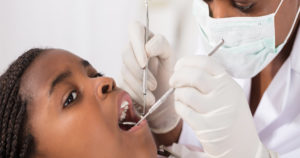Dental Appointments During COVID-19
June 15, 2020 Even though COVID-related restrictions are starting to loosen up, things are still not 100% back to normal. Dentists in the southeastern Pennsylvania region are now able to perform routine dental cleanings and other procedures. With dental offices opening, now is a good time to learn about a few of the key differences you should be expecting to see during your next in-person visit.
Even though COVID-related restrictions are starting to loosen up, things are still not 100% back to normal. Dentists in the southeastern Pennsylvania region are now able to perform routine dental cleanings and other procedures. With dental offices opening, now is a good time to learn about a few of the key differences you should be expecting to see during your next in-person visit.
Offices are taking many precautions to keep both staff and patients safe. Coronavirus, a highly contagious respiratory illness, is mostly commonly spread through respiratory droplets that an infected person produces when they talk, cough, or sneeze. The state is requiring dental offices to implement several control methods in hopes of inhibiting viral transmission rates as much as possible.
What Changes to Expect
The Centers for Disease Control and Prevention (CDC) categorize dentistry as potentially very high risk for COVID-19 transmission. However, the agency has not yet identified any viral clusters in dental settings, and believes that so long as offices follow the agency’s stringent protective guidelines, transmission rates should not increase.
One change you may notice right off the bat is that there are no magazines in the waiting room. Another thing: whether or not you have dental insurance, your appointment might cost a little bit more than it did before. This is because lots of dentists are increasing their rates to cover expenses associated with purchasing PPE, or personal protective equipment, for staff members. In terms of PPE, staff members have to put on and take off their gear at the office – not in their homes. Dentists and techs alike are switching out their surgical masks for N-95 respirators. And most dentists are wearing scrub suits under their gowns, as well. All staff members are to change their PPE out from one patient to the next and for the first time in a little over 40 years the rules require providers to wear goggles and gloves.
Dentists also have to take lots of precautions when it comes to their tools. The CDC has several guidelines and safety and health standards in place to oversee the use of dental unit waterlines, or DUWLs, dental cleaning equipment, autoclaves (heated units that use steam to sterilizer items), suction tools, air compressors, vacuums, and even for office radiography equipment, or X-rays. The agency also established numerous administrative controls and work practices. To learn more about the CDC’s rules for dental operations you can visit https://www.cdc.gov/oralhealth/infectioncontrol/statement-COVID.html
The CDC is also urging all dental offices to ensure that their spaces are properly ventilated and to open windows as much as possible. The agency recommends that facilities consider using portable HEPA air filters to clean rooms efficiently between patients. There are also several cleaning protocols for rooms, such as letting them sit for a certain amount of time before sanitizing them after one appointment has ended and another is about to begin. Following the CDC’s standards is a critical step in limiting viral transmission rates and keeping everyone safe.
These changes are meant to ensure public safety, so if you are feeling sick it is important to reschedule an appointment. Because guidelines are constantly changing as we keep learning more, we will keep our readers up to date on any new developments. If you have a legal question or concern, someone on our team can help. Please contact a representative online now.
Philadelphia Medical Malpractice Lawyers at Galfand Berger, LLP Representing Injured Individuals Since 1947
With offices located in Philadelphia, Bethlehem, Lancaster, and Reading, we serve clients throughout Pennsylvania and New Jersey. To schedule a consultation, call us at 800-222-8792 or complete our online contact form.
 Google Screened
Google Screened
